Real-world opportunities. Welcoming. Supportive.
That’s how seven new alumni describe their undergraduate experience in the College of Education and Human Development. Whether it was participating in a research project or completing an internship, these grads exemplify the benefits of the outreach and engagement opportunities incorporated into CEHD majors. They also reflect the diversity of the college’s undergraduates, who bring a range of lived experiences.
Pathway to medicine
• Family social science
Khadija Said (sa-YEED) is used to forging her own path. She immigrated to Minnesota from Kenya when she was 14 and was the only Muslim student in her suburban middle school. When she entered the University, she was the first female in her family to pursue higher education.
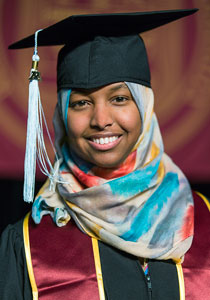
Said worked toward her goal of becoming a doctor by taking the necessary science and math prerequisites. But a major in the hard sciences just didn’t feel right. That’s when she found family social science.
“Coming from a Somali community with such a collective culture and mindset, it was always hard to find Khadija the individual, and this major has helped me do that,” she says.
As the 2014 undergraduate commencement student speaker, Said described how family social science helped her understand that creating a dialogue about differences was important to helping people understand her culture. She says associate professor William Goodman’s counseling courses led to her decision to pursue psychiatry, a field that is not widely accepted in Muslim culture.
“My culture trusts every other medical field except psychiatry, so I think if they see a Muslim person in this role, it will be a lot easier for them to be willing to understand that the person needs help,” she says.
Said has already helped bridge this divide as a volunteer at the University of Minnesota Medical Center, Fairview, in Minneapolis. She joined a Muslim family in group therapy, and says the doctor was blown away by her ability to connect to the patient’s family through the lens of their faith.
She also worked with assistant professor Tai Mendenhall’s Family Education Diabetes Series (FEDS) research project, which works with the Native American community on improving health by incorporating cultural identity in the delivery of services.
Said is excited to begin medical school at Saint James College of Medicine in Chicago. But, she says, she will miss the family social science community.
“I had amazing professors who knew me by name and who really took the time to get to know me,” says Said. “My best friends are in family social science. I loved every minute of it.”
Big Ten experience
• Sport management
Being a Gopher fan has been a way of life for Kelly Miller since she was young. Miller’s grandfather played basketball for the Gophers in the 1940s, and she grew up going to Gopher games. She came to the University set on majoring in sport management and pursuing a career as a sports agent.
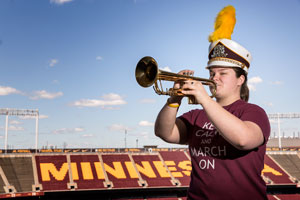
Miller says classes like facilities and event management with former University athletics director Joel Maturi gave her firsthand examples of what it would be like to work in the field, and an internship at Concordia University in St. Paul honed her skills.
“Another great thing about the program was the guest speakers from all of the professional sports teams—the Timberwolves, the Wild, the Vikings, and the Twins… It gave us the opportunity to meet people,” she says.
One of those speakers hired her for her current job as a sales executive at Gopher Athletics.
“After class I asked him about opportunities because I was looking for a job in sales,” says Miller. “He said they only hired graduates, so I sent him my résumé after I graduated and got the interview and then the job.”
Miller’s affinity for the Gophers extends to her involvement in the Pride of Minnesota Marching Band and the men’s basketball pep band. She was a leader of the marching band’s trumpet section and also received a band scholarship.
“I tell people all of the time that joining the marching band was the best decision I ever made in college. It really helped me connect to the University,” she says. “The band gave me lifelong friends, physical, mental, and emotional support, and an experience that will stay with me forever.”
Miller is applying to several law schools over the next year. Her goal is still to become a sports agent or to work for a professional franchise or Big Ten school to negotiate contracts.
“My different experiences in the sport management program opened my eyes to my options,” she says. “I can go anywhere in sports, and so much of the experience you get translates between jobs.”
Friendship for life
• Kinesiology | Youth studies
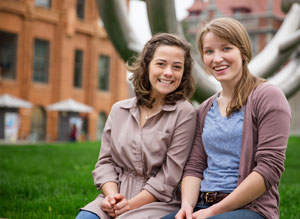
Torey Alberda and Jade Beauclair laugh as they recall the first time they met. It was the first semester of their freshman year, and both had come to a campus ministry group hoping to meet other first-year students. Beauclair was living by herself in a dorm with mainly juniors and seniors, and Alberda was still looking for someone she felt she could relate to.
“We are both Yankees fans, we both graduated from classes of 30 in high school, we both don’t have our ears pierced,” says Alberda. One grew up on North Dakota and one in South Dakota.
“Torey thought my name was Jane at first and got really excited because that’s her mom’s name,” says Beauclair. “We were looking for anything to have in common.”
After four years of friendship, the pair is now connected on a much deeper level. Alberda was Beauclair’s maid of honor at her wedding, and they are both pursuing youth-related work. Alberda works as a personal care assistant and tutor for families with children with special needs. An experience working at a camp for kids with special needs led her to switch her major from chemistry and pursue an occupation working with people. She found the right fit with the kinesiology major.
“Professors get to know you and they care deeply about you,” says Alberda, whose career goal is to become a physical therapist.
Beauclair is an elementary education teacher in the Twin Cities with Teach For America, part of the first cohort of students earning their teacher’s license through a new partnership through the U of M–TFA partnership. She was always interested in teaching but wanted to learn youth skills that a teacher would need, especially to teach in the inner city. That’s why the youth studies major was the perfect fit for her.
“When I came to the orientation presentation for youth studies, it was so easygoing and hilarious, painted as a kind of family atmosphere,” says Beauclair. “Coming from a small high school to the University, I definitely wanted that.”
Both Alberda and Beauclair took advantage of CEHD research opportunities. Alberda worked with kinesiology professor Maureen Weiss on a project to track the success of Girls on the Run, a nonprofit organization that teaches life skills and character development through running. Beauclair was a McNair Scholar, working with postsecondary teaching and learning instructor Robert Poch on a research project about how to recruit teachers of color.
“I can honestly say that there are things I’m going on to do that I would not be doing had professors not believed in me and allowed me to have undergraduate opportunities that really set me up for success post-graduation,” says Beauclair.
Ambassador energy
• Business and marketing education
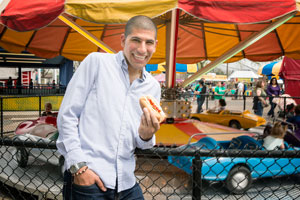
Joe Zerka’s enthusiasm for people is infectious, a trait that serves him well as an official ambassador for Oscar Mayer. As a Hotdogger, he and a partner are spending a year driving across several states in the company’s official Wienermobile. Zerka says his business and marketing education degree and minor in leadership were great training for this position.
“My courses taught me how important it is to build relationships,” says Zerka. “I love putting smiles on people’s faces and creating that ‘remember when’ moment.”
As a transfer student from a community college, Zerka was surprised by how easy it was to build relationships with his professors and advisers. They remembered his name and were always available.
“The professors in CEHD teach in a way that is so real-life. They treat you with respect and want you to succeed,” he says.
Zerka is a first-generation college student. He says he owes his success to his parents, who emigrated from Lebanon. His father stressed to Joe and his three brothers the importance of getting an education and degree as a way to a better life.
“I want to prove to my parents that I did not just get a degree,” says Zerka. “I got a life.”
Through the college’s leadership minor, Zerka spent a May term in South Africa, where he volunteered working with children and took a class at the University of Cape Town. He also took spring break trips through the Students Today Leaders Forever program, completing service projects in six cities over spring break.
Zerka is not sure where he’ll land after his yearlong stint as a Hotdogger is over. He has completed a corporate sales internship so may pursue something in that field, but he says the welcoming environment in CEHD has helped him figure out what he loves to do.
“The program teaches you how to be the best you.”
Veteran to teacher
• Elementary education foundations
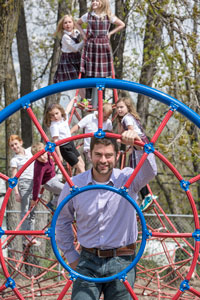
Zach Steigauf’s path to teaching was unconventional, but the roots of it began at a young age. He was one of the oldest kids among his large extended family, so he had a lot of opportunities to teach.
“I’ve always liked to be helping, even when I was as young as five years old,” he says. “One of my favorite things to do with my siblings and cousins was to teach them how to ride a bike.”
But in a traditional classroom, Steigauf didn’t feel as engaged. He says school was just something to get through. After graduating early from high school in Lindstrom, Minnesota, he took courses at a community college, but that didn’t feel right, either.
Steigauf enlisted in the army as a cavalry scout in 2004. He was deployed to Iraq twice for year-long tours, once to Tal Afar and once to Baghdad. His duties included security operations, patrols, raids, and intelligence.
“Through my experiences in the army, I have learned to set goals and embrace challenges in my motivation to be a stronger and overall better person,” he says.
Returning to Minnesota in 2008, Steigauf enrolled in classes at Itasca Community College before entering the University a year later. He wanted to pursue business and entrepreneurship. Then a service-learning experience at Southside Family Charter School in Minneapolis drew him back to his childhood enjoyment of working with kids.
“The teacher there showed me a lot,” he says. “I wanted to be a part of creating that same supportive environment for children.”
Steigauf switched his major to elementary education foundations and knew right away it was the right decision. He completed practicum experiences at a variety of urban and suburban schools.
“I didn’t care how far I had to drive, I just wanted the best mentor teachers,” he says, “and the program staff did an amazing job setting me up with teachers that were great for me.”
Now he’s enrolled in CEHD’s elementary education teacher licensure/master of education program, completing his student teaching in Lino Lakes. He says the skills he honed in the army, such as organization, a strategic mindset, and collaboration, will transfer well to the classroom.
“I would like to continue my education forever,” he says. “This has been a great experience. I started out not liking school and now I am going to miss this place. I hope to be in school in one way or the other for the rest of my life.”
Foundation for lifelong learning
• Early childhood education foundations
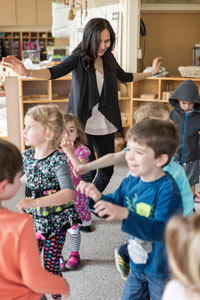
Becoming a teacher has been a longstanding goal for Almas Merchant, who immigrated to the United States almost twenty years ago. In Pakistan, Merchant studied English and economics at the University of Karachi and became a certified Montessori teacher. Infants and young children have always fascinated her because of their enthusiasm and openness.
“There are no boundaries,” she says. “They can be from different cultures and backgrounds, but those young minds and young hearts are so open and they are always so curious.”
Merchant enrolled at the University in 2010, intent on earning her American bachelor’s degree in early childhood education. A student teaching experience at the Shirley G. Moore Lab School introduced her to the Reggio Emilia approach to teaching young children. The philosophy emphasizes self-guided learning to promote thinking and creativity.
“In my experience, if the child is interested in something they will bloom and ask for more information,” she says. “That’s why I like it, because it promotes lifelong learning.”
Merchant has two teenagers and says her family has been very supportive of her pursuing her education.
“Learning about executive function and how to control emotions has also been useful in talking with my teenagers,” she says, laughing.
She adds that the support of her professors and advisers in CEHD have been key to her success.
“Coming from a different culture and studying at the University of Karachi was totally different from how and what I studied here,” she says. “The whole CEHD community embraced me with open arms and really helped me in achieving my goals, and I felt fully supported. When you get full support from both sides, then your experiences will really be excellent.”
Merchant is interested in working at a school in the Twin Cities that uses the Reggio Emilia approach. She plans to pursue her master’s degree and teaching license in early childhood education or special education.
“Whenever I think about it, I get excited,” she says. “I just want a reason to go back to the University.”
Learn more about CEHD’s 10 undergraduate majors as well as graduate and professional programs.
Story by Christina Clarkson | Photos by Greg Helgeson | Fall 2014; updated January 2017
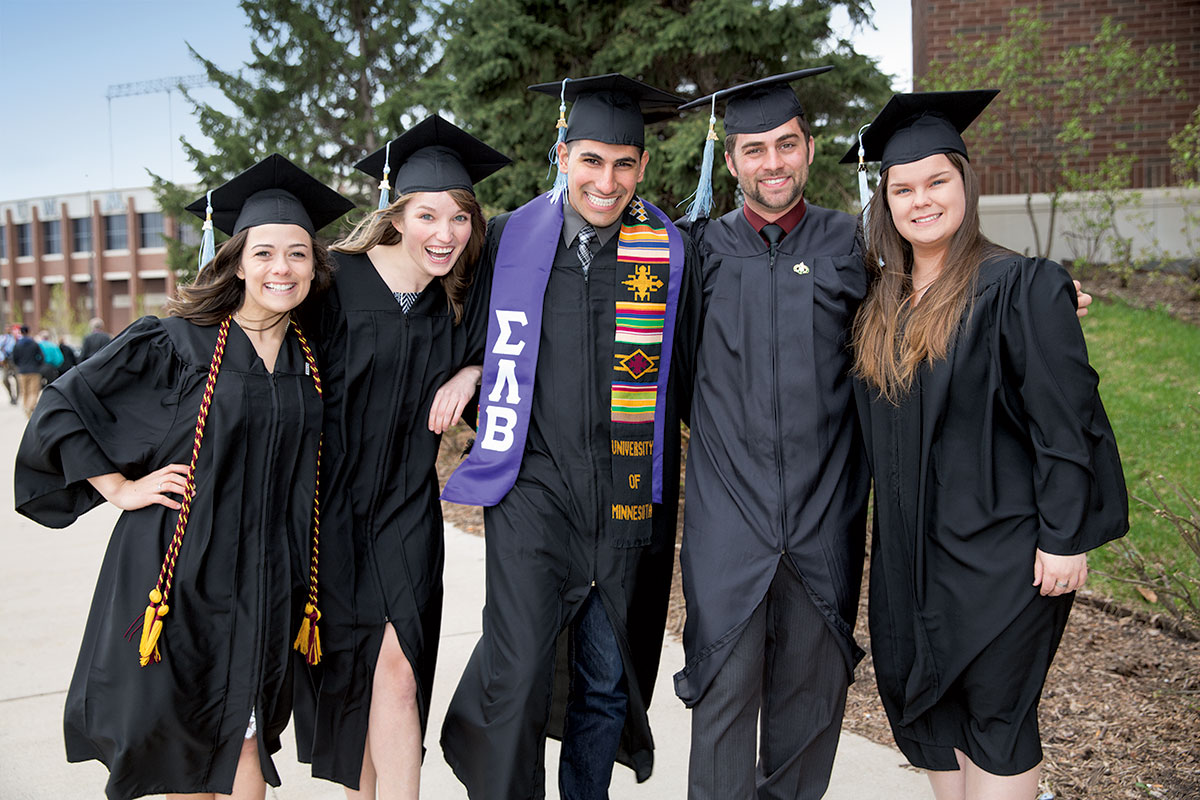 Celebrating at commencement were Jade Beauclair, Torey Alberda, Joe Zerka, Zach Steigauf, and Kelly Miller.
Celebrating at commencement were Jade Beauclair, Torey Alberda, Joe Zerka, Zach Steigauf, and Kelly Miller.